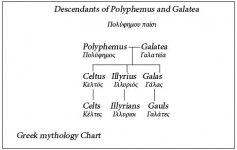Life is not fair. Hg N-O-P-R people were born later thus had to occupy cold Central Asia. The less able died in the cold. The survivors were toughened and made smarter. So they moved north (Siberia) east (China) and west (Anatolia then up the Danube) and even south to India. They had it tough. The R1b that took over Europe did not eliminate all the E and G as the Sea People had advanced weapons who could fight off the R1b people on the coastal areas of southern Europe. The Sea People were E, G and I people.
Yes this could be.
I don't want to wander too much off the topic,
but in defense of neolithic people,
I am not sure if a large state like communities existed in neolithic Europe, or any large groups in hold of territory comparable in scale with today's France or Spain. Maybe they were conscious about common heritage as such, but not sure about forming some sort of town confederations capable of defending common ground and territory.
There were also surely lots of free spaces for new settlers to claim. This does not undermine military success in eradication of previous inhabitants, if that was what happened.
My personal impression is that neolithic people of Europe lived in extended families and tribes in something like a town or more often village structures, were pretty much scattered, and mostly interested in basic survival by defending a small perimeter around their settlement. Some towns though, could have accommodated quite a large community, but were still a small hold in terms of territory.
I think that developed form of agriculture that produced large armies, and boosted population in general, started with the arrival of metal tools, that made better ploughing possible. Also, neolithic farming was at best, modest in terms of production.
Last edited:


